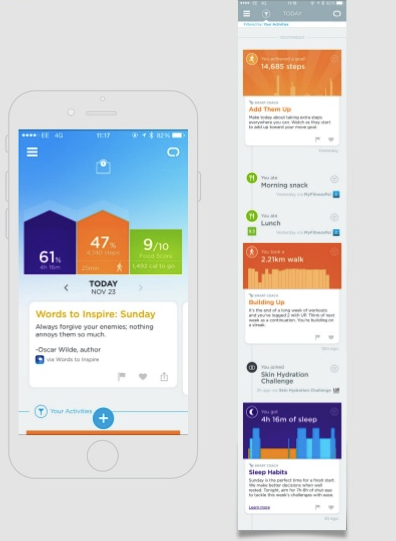The American head office of Ogilvy CommonHealth, the team of health-related trends analysts, has released a new report «Wearable Technology Futures 2020: A New Path for Public Health?» that looks at potential of the much-discussed wearable devices, such as Jawbone, Fitbit and others, to improve the level of public health—specifically, in the U.S.
According to WHO (World Heath Organization), the worldwide obesity has doubled since 1980. In 2008, nearly a quarter of the surveyed adults older 20 years old were classified as overweight, while 11%—as obese. An alarming fact is that younger generation is gaining weight even faster: in 2013 nearly 42 million children worldwide were already obese, mainly due to unhealthy diet and physical inactivity.
Despite the fact that health-tracking wearable devices are designed to manage physical activity and encourage active lifestyle, one third of users of such devices in the U.S. dropped them within first six months, Endevour Partners found in their research as of November 2014.
In this recent research, Ogilvy CommonHealth prove that the main reason of the user drop is that most wearable devices serve more as data purveyors rather than health change agents and do not provide information on the consequence of behavior, lack time management options and instructions on where, when and how to perform various forms of physical exercises.
To find out this, Ogilvy CommonHealth referred to the «Behaviour Change Technique Taxonomy», a catalogue of 93 techniques to change behaviour, selected six of them and analyzed how four popular wearable heath trackers —Jawbone UP24, Fitbit Flex, Misfit Shine and Withings Pulse 2—help change lifestyle against the six domains.
The researchers found out that all of the four devices provided such options as ‘facilitation of social comparison,’ ‘action planning’ and ‘reinforcing effort towards behaviour,’ however most of them failed to provide time management option, as well as information on the consequences of behaviour and instruction on better performance. Only Jawbone UP24 offered the two latter options.

This finding supports the point of PwC’s earlier research on wearable health tech that 77% of users want their devices to let them ‘exercise smarter’, not just get the numbers and track raw data.
Ogilvy CommonHealth’s own user panel has been testing the four devices and their respective apps for 23,040 hours in total. In the report the team shares a detailed feedback on each one and suggests six scenarios of «smarter» use of wearable tech that can truly improve health and wellbeing.
Please view the full report here.